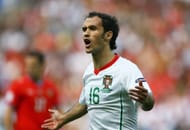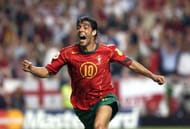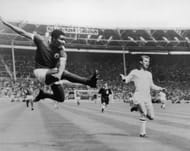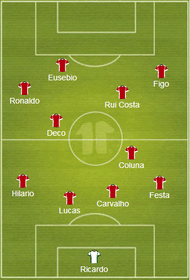Portugal’s World Cup history is limited, and most of it is recent: 5 appearances at the finals thus far, of which 3 came in the last decade. However, the Selecção das Quinas have an impressive strike rate: two semi-finals and one Round of 16. Essentially, their all-time World Cup XI picks itself.
Goalkeeper – Ricardo
Few goalkeepers have influenced a World Cup campaign to the extent Ricardo did in 2006. In the group stages, Portugal conceded just 1 goal in 3 games, with the Sporting man pulling off a series of excellent saves. In the quarter-final against England, he became the first ‘keeper to make 3 saves in a World Cup shootout, denying Frank Lampard, Steven Gerrard and Jamie Carragher to ensure Portugal’s first semi-final in 40 years. Be it scoring or saving in a shootout, Ricardo could do it all.
Defenders: Alberto Festa – Vicente Lucas – Ricardo Carvalho – Hilario
Lucas would be the tough guy in central defence. Even by the tolerant standards of the 1960s, Lucas was renowned for his no-nonsense defending. When Portugal met Brazil, he roughed up their forward line mercilessly - especially Pele. The little genius angrily declared that he was quitting football, citing the dirty tackling as a reason. However, behind that tough exterior was a genuinely talented player; at his peak Lucas was among the best defenders in the world.
Ricardo Carvalho is arguably the greatest Portuguese defender of all time. An adept passer of the ball, he would be the perfect foil for hard men like Lucas. The UEFA defender of the year 2003-04 enjoyed a successful club career and is Jose Mourinho’s most trusted player. The Portugal Greatest XI has several excellent attackers, but Carvalho provides the foundation at the back.
A left-sided defender and a one-club man (Sporting Lisbon), Hilario was good at both Left Back and Centre Back. His rock-solid presence, combined with overlapping runs in possession, would be crucial for a team so heavily dependent on wingers.
Right-back is perhaps the weak link in this team – if only because of the outrageous quality in other positions! Nevertheless, Alberto Festa was a competent defender for FC Porto, and played 3 games for the 1966 side.
Midfielders: Mario Coluna (C) – Deco – Manuel Rui Costa
The captain of Portugal’s legendary 1966 side, Mario Coluna was a superb midfielder. His work rate, stamina and sheer physicality allowed him to dominate central midfield and drive the side forwards. Revered and feared in equal measure, he was titled The Sacred Monster. Like teammate Eusebio, Coluna was born in Mozambique and played for Benfica.
When a young Deco joined Benfica in the ‘90s, manager Graeme Souness didn’t think he had the talent to play at the top level. It wasn’t Souness’ first error of judgment - as Liverpool will testify - but is probably his worst. A brilliant playmaker, the Brazilian-born Deco was a late bloomer who could create, score and run around all day. His immaculate goals and assists were especially handy after Rui Costa’s retirement. In this team, he would probably play deeper, as a central midfielder, allowing the other forwards to run at goal. It’s a role the selfless Deco would have performed with distinction.
Like Deco, Rui Costa could play anywhere between the penalty boxes. Usually employed as a number ten, the Benfica and Milan man’s presence was crucial because Portugal lacked a good striker, as they still do; but Costa more than compensated. His sole World Cup (2002) unfortunately came when he was past his best; but at Euro 2000, spearheading Portugal’s return to the footballing high table, he left us all in no doubt of the sheer raw ability he possessed at his peak.
Forwards: Luis Figo – Eusebio – Cristiano Ronaldo
Few modern footballers have achieved more than Luis Figo. The ‘golden boy’ of Portuguese football was arguably the greatest crosser and dribbler of his generation carrying Barcelona solo in the late 90s. Later he came out of international retirement to lead his side at Germany 2006, as did fellow Galactico Zinedine Zidane. The two met in the semi-finals and were evenly matched but for a Zizou penalty, ending Figo’s hopes of being the first Portugal captain to win a major trophy. 2006 will be known as Zidane’s World Cup, but the narrative could just as easily have run Figo’s way.
Man of the match in all 3 group stage games at South Africa 2010, Ronaldo seemed set to power his side to glory; but a scrappy 0-1 defeat to eventual champions Spain ended the dream. The abiding World Cup memory of Ronaldo remains his 2006 quarter-final clash with Man United teammate Wayne Rooney, with the latter being sent off. He attracted a lot of hostility from the British media at the time. However, subsequent criticism about his Portugal performances is unfair: in the 2014 qualification play-offs, he single-handedly powered his team to victory against Sweden. When he’s in form, no defence can withstand a Ronaldo onslaught.
Nicknamed ‘Black Pearl’, Eusebio was an incredible player: talented, strong, ruthless – and an exemplary sportsman. He ranks right up there with Alfredo di Stefano as the best centre-forward of his era; and perhaps no player has made as much impact in a debut World Cup as he did in 1966, scoring 7 goals. When fellow debutants North Korea took a 3-0 lead within 22 minutes in the Q/Fs, Eusebio scored four to ensure a 5-3 win. It remains a defining moment for the Benfica man. Ironically, Portugal’s greatest ailing since then is the lack of a really good centre-forward: when they did produce one, he was unmatchable.
Substitutes: Pauleta, Simao, Jorge Andrade, Fabio Coentrao, Jose Augusto, Vitor Baia
Honourable Mentions: Several greats like Paulo Sousa, Vitor Baia and Manuel Bento, whose lack of World Cup experience unfortunately excludes them from this list.
You can read the greatest XI of other teams here: FIFA World Cup Greatest XIs



